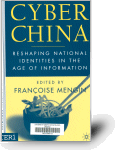![]()

Cyber China: Reshaping National Identities in the Ages of Information
Françoise Mengin
abstract
Does cyberspace prefigure a border-less world? To better understand the political implications of new information technologies, the so-called greater China region offers a case in point for it is an ethno-economic space crossing national boundaries at a pace with globalization. The development of an information economy can only generate new power struggles and provide new opportunities for accumulation of wealth in both material and symbolic terms. In so doing, new relations of domination and subordination are being instituted. The various chapters in this volume shed light on public and private actors' strategies aiming at monopolizing benefits provided by the information society, be it for government regulation purposes or for private enrichment. It also explores the new power poles that are consequently emerging. Beyond the historicity of each process, the authors show how the development of the knowledge economy contributes, though often in a highly ambivalent way, to both unification and fragmentation on very different scales.
keywords
economy, global networking, greater China, information society, information technologies, Internet
catalogue card
Title: Cyber China: Reshaping National Identities in the Ages of Information
Author: Françoise Mengin
Publication: New York: Palgrave Macmillan, 2004
Subjects: Internet - Conferences - China, China - Economic conditions - Conferences, China - Politics and government - Conferences
ISBN: 1-4039-6578-1
index
Acknowledgment
Romanization of Chinese Names and Terms
List of Acronyms
Notes on the Contributors
INTRODUCTION
New Information Technologies and the Reshaping of Power Relations: An Approach to Greater China's Political Economy
PART 1: NEW MEANS, A NEW POLITY?
CHAPTER ONE
Speaker's Corner or Virtual Panopticon: Discursive Construction of Chinese Identities Online
CHAPTER TWO
Cyberspace and the Emerging Chinese Religious Landscape - Preliminary Observations
CHAPTER THREE
The Changing Role of the State in Greater China in the Age of Information
PART 2: COMMUNICATION AND CONTROL: SOVEREIGNTY IN THE AGE OF THE INTERNET
CHAPTER FOUR
Controlling the Internet Architecture within Greater China
CHAPTER FIVE
Government Online and Cross-Straits Relations
CHAPTER SIX
The Internet and the Changing Beijing - Taipei Relations: Toward Unification or Fragmentation?
PART 3: GLOBAL NETWORKING AND ECONOMIC INTERACTIONS
CHAPTER SEVEN
The Information Technology Industry and Economic Interactions Between China and Taiwan
CHAPTER EIGHT
Global Networking and the New Division of Labor Across the Taiwan Straits
CHAPTER NINE
Informational Capitalism and the Remaking of "Greater China": Strategies of Siliconization
CHAPTER TEN
Urban Assemblages: An Ecological Sense of the Knowledge Economy
Name Index
Subject Index
editorial
The use of the Internet in healthcare, focus of a new section: the dossier
in-depth
Cybertext challenge: teaching literature in the digital world, by Raine Koskimaa. Presentation by Laura Borràs
dossier
Health interventions on the Internet, coordinated by E. Hernández and B. Gómez-Zúñiga
Introduction: A study of health interventions on the Internet, by E. Hernández and B. Gómez-Zúñiga
- Experiences in online intervention in one field: tobacco addiction, by J.M. Suelves
- Experiences of hybrid-design online interventions, by M. Armayones and N. Guillamón
- Health portals, by P. Roqué
Conclusions: State of the art and prospects for the future, by M. Pousada, L. Valiente and M. Boixadós
miscellany
Hacia una nueva concepción de los estudios literarios en el espacio europeo de enseñanza superior (EHEA), by Laura Borràs
R&D, innovation and public policy: towards a new economic policy for innovation, by Maria Callejón
analysis and debate
A bibliographic review of relations between literature and technology. The state of the art at Spanish universities, by Joan-Elies Adell
Greening-Turisme: a platform for exchanging knowledge geared towards the dissemination of sustainable tourism through ICTs, by F. González, O. Miralbell, M. G. Nel·lo and F. Romagosa
reviews
Didáctica universitaria en entornos virtuales de enseñanza aprendizaje, by G. Bautista, F. Borges and A. Forés. By Enric Serradell
selection of books
 ANDERSON, C. (2006). The Long Tail: Why the Future of Business Is Selling Less of More
ANDERSON, C. (2006). The Long Tail: Why the Future of Business Is Selling Less of More
 GUPTA, D.K. (2006). Marketing Library and Information Services: International Perspectives
GUPTA, D.K. (2006). Marketing Library and Information Services: International Perspectives
 JENKINS, H. (2006). Convergence Culture: Where Old and New Media Collide
JENKINS, H. (2006). Convergence Culture: Where Old and New Media Collide
 JENKINS, H. (2006). Fans, Bloggers, and Gamers: Exploring Participatory Culture
JENKINS, H. (2006). Fans, Bloggers, and Gamers: Exploring Participatory Culture
 MENGIN, F. (2004). Cyber China: Reshaping National Identities in the Ages of Information
MENGIN, F. (2004). Cyber China: Reshaping National Identities in the Ages of Information
 MURERO, M. (2006). The Internet and Health Care: Theory, Research, and Practice
MURERO, M. (2006). The Internet and Health Care: Theory, Research, and Practice
 WHITE, M. (2006). The Body and the Screen: Theories of Internet Spectatorship
WHITE, M. (2006). The Body and the Screen: Theories of Internet Spectatorship
 The texts published in this journal, unless otherwise indicated, are subject to a Creative Commons Attribution-Noncommercial-NoDerivativeWorks 2.5 licence.
It may be copied, distributed and broadcast provided that the author and UOC Papers are cited. Commercial use and derivative works are not permitted. The full licence can be consulted on http://creativecommons.org/licenses/by-nc-nd/2.5/es/deed.en
The texts published in this journal, unless otherwise indicated, are subject to a Creative Commons Attribution-Noncommercial-NoDerivativeWorks 2.5 licence.
It may be copied, distributed and broadcast provided that the author and UOC Papers are cited. Commercial use and derivative works are not permitted. The full licence can be consulted on http://creativecommons.org/licenses/by-nc-nd/2.5/es/deed.en





